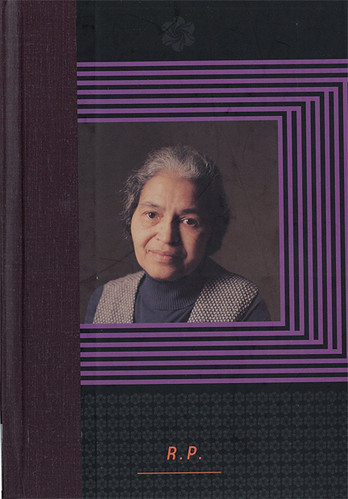Rosa McCauley was born on February 4, 1913 to James McCauley a carpenter and Leona Edwards, a schoolteacher in Tuskegee, Alabama where Booker T. Washington had founded the Tuskegee Normal Industrial School. Later, upon the separation of her parents, she was raised in Pine Level, Alabama. Her uncle was a preacher in the Mount Zion AME Church which was founded in 1816. Her religious uncle and mother both had a profound influence on her life. The Libraries’ Smithsonian American Art Museum/National Portrait Gallery Library houses the biography, Rosa Parks by Douglas Brinkley. In it he writes:
Faith in God was never the question for Rosa Parks; it was the answer. All her life she disagreed with novelist James Baldwin’s strident claim that “to be black in America is to live in a constant stage of rage.” The teachings of Jesus Christ had convinced her instead, as they had Martin Luther King, Jr., that a heart filled with love could conquer anything, even bigotry. “From my upbringing and the Bible I learned people should stand up for rights,” she recalled, “just as the children of Israel stood up to the Pharaoh.”
She was educated from the age of eleven at the Montgomery Industrial School for Girls, a progressive school founded at the end of the Civil War by Alice White and Margaret Beard, whose philosophy of education was inspired by Booker T. Washington (1856-1915). Of the school’s strict administration of virtuous behavior, and industry, and thrift Parks is quoted, “We were taught to be ambitious and to believe that we could do what we wanted in life.” Rosa McCauley had ambitions to be a teacher as her mother, but the illness of her grandmother and mother necessitated her to leave school and go to work. This pattern of putting the needs of others above her own remained a constant throughout her long life.
Upon the encouragement of Raymond Parks, who she married in 1932, she earned her high school diploma in 1933. After marriage she became active in the NAACP serving as informal advisor to a youth group and later as a branch secretary. Along with many other states, Alabama had Jim Crow laws which created an official system of segregation after the Civil War. The 1896 United States Supreme Court decision Plessy v. Ferguson authorized the idea of separate but equal in schools, restaurants, hospital and other public facilities. After leaving work on December 1, 1955, she took a seat on a Montgomery, Alabama bus. The driver demanded that those in this area give their seats up to a white man, as a “colored” couldn’t sit parallel to him. Rosa Parks said “No.” Later, Brinkley quotes her:
“When I declined to give up my seat, it was not that day. Or bus, in particular. I just wanted to be free like everybody else. I did not want to be continually humiliated over something I had no control over: the color of my skin.”
She was promptly arrested and the rest is history. Her case was taken up by civil rights lawyers, and Baptist ministers Ralph Abernathy (1926-1990) and Martin Luther King Jr. (1929-1968). Her quiet courage gave rise to the Montgomery bus boycott and let to the civil rights movement. Childless herself, Rosa Parks was happily involved with the welfare of youth throughout her life. She wrote the following books, My Story, Quiet Strength and Dear Mrs. Parks: A Dialogue with Today’s Youth. Proceeded in death by her mother, husband and only brother, she spent the final years of her life “at peace” continuing to read from the King James Bible while watching ships pass from her twenty-fifth floor apartment overlooking the Detroit River. She died on October 25, 2005 at the age of ninety-two.
—Alice Clarke, Smithsonian American Art Museum/National Portrait Gallery Library
Image from Rosa Parks, Douglas Brinkley, Penguin Group, New York, 2000.


One Comment
[…] Georgia O’ Keeffe and Maria Mitchell who changed the way we see the world, and brave women like Rosa Parks and Malala Yousafzai who stood up for what was right. During this Women’s History Month and […]